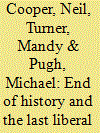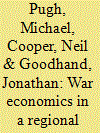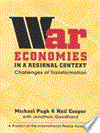|
|
|
Sort Order |
|
|
|
Items / Page
|
|
|
|
|
|
|
| Srl | Item |
| 1 |
ID:
114997


|
|
|
|
|
| Publication |
2011.
|
| Summary/Abstract |
In the April 2010 Review of International Studies, Roland Paris argued that liberal peacebuilding is the only viable solution for rebuilding war-torn societies, and supported this by assailing critics of the liberal peace. In this article we challenge four key claims made by Paris: imposed and consensual peacebuilding are different experiences; there are no echoes of imperialism in modern peacebuilding; there is no alternative to the capitalist free market; and critics of the liberal peace are 'closet liberals'. We argue that Paris ignores the extent to which all peacebuilding strategies have had a core of common prescriptions: neoliberal policies of open markets, privatisation and fiscal restraint, and governance policies focused on enhancing instruments of state coercion and 'capacity building' - policies that have proved remarkably resilient even while the democracy and human rights components of the liberal peace have been substantially downgraded. There is little space to (formally) dissent from these policy prescriptions - whether international peacebuilders were originally invited in or not. Furthermore, the deterministic assumption by Paris that 'there is no alternative' is unjustifiable. Rather than trying to imagine competing meta-alternatives to liberalism, it is more constructive to acknowledge and investigate the variety of political economies in post-conflict societies rather than measuring them against a liberal norm.
|
|
|
|
|
|
|
|
|
|
|
|
|
|
|
|
| 2 |
ID:
006012


|
|
|
|
|
| Publication |
New York, Manchester University Press, 1994.
|
| Description |
xvii, 302p.
|
| Standard Number |
0719045630
|
|
|
|
|
|
|
|
|
|
|
|
Copies: C:1/I:0,R:0,Q:0
Circulation
| Accession# | Call# | Current Location | Status | Policy | Location |
| 037805 | 359/PUG 037805 | Main | On Shelf | General | |
|
|
|
|
| 3 |
ID:
080130


|
|
|
| 4 |
ID:
052309


|
|
|
|
|
| Publication |
Spring 2004.
|
| Summary/Abstract |
A deconstruction of the role of peace support operations suggests that they sustain a particular order of world politics that privileges the rich and powerful states in their efforts to control or isolate unruly parts of the world. As a management device it has grown in significance as the strategic imperatives of the post-industrialized, capitalist world have neutered the universal pretensions of the United Nations. Drawing on the work of Robert Cox and Mark Duffield, this essay adopts a critical theory perspective to argue that peace support operations serve a narrow, problem-solving purpose - to doctor the dysfunctions of the global political economy within a framework of liberal imperialism. Two dynamics in world politics might be exploited to mobilize a counter-hegemonic transformation in global governance. First, a radical change in the global trade system and its problematic institutions will create opportunities to emancipate the weak from economic hegemony. Second, future network wars are likely to require increasingly subtle and flexible teams, similar to disaster relief experts, to supply preventive action, economic aid and civilian protection. This might only be achieved by releasing peace support operations from the state-centric control system, and making them answerable to more transparent, more democratic and accountable multinational institutions.
|
|
|
|
|
|
|
|
|
|
|
|
|
|
|
|
| 5 |
ID:
082225


|
|
|
|
|
| Publication |
2008.
|
| Summary/Abstract |
This article contends that the complex administrative mechanics prescribed in the Dayton Accords presented opportunities for nationalist leaders to abuse public office. At the same time, economic reforms and a high degree of decentralization gave elites and local communities the facility to resist externally induced structural adjustment. The economic paradigm introduced for transition limited any attempt to establish a social contract between individual and the state. Consequently, a degree of social cohesion remains through adherence to local, clientelistic loyalties and informal economic activity. This provides the cultural and structural economic context in which the abuse of public office flourishes
|
|
|
|
|
|
|
|
|
|
|
|
|
|
|
|
| 6 |
ID:
115319


|
|
|
|
|
| Publication |
2012.
|
| Summary/Abstract |
Multilateral interventions for regime change are not new, but their mutation has been congruent with an aggressive attempt to introduce liberal values into peacekeeping and related operations discernible from the 1990s. While recognizing non-coercive, needs-based elements of interventions for peace, this article contends that regime change wars have harmonized with the UN's facilitation of aggressive peace missions and coercive peacebuilding. In the 1990s the perceived failures of, and demands on, the UN, led to a general policy of permissiveness for Western states to pursue regime change, accompanied by reconstruction and development opportunities to promote neoliberal ideas of political economy in war-torn societies. This article focuses on two aspects of international operations fostered through or by the UN: the militarization of peace missions and peacebuilding through neoliberal political economy. It commends further research into the networks of power and resistance that have populated aggressive peace.
|
|
|
|
|
|
|
|
|
|
|
|
|
|
|
|
| 7 |
ID:
048885


|
|
|
|
|
| Publication |
London, Frank Cass, 1997.
|
| Description |
24cm.
|
| Series |
Cass series on peacekeeping
|
| Standard Number |
0714647594
|
|
|
|
|
|
|
|
|
|
|
|
Copies: C:1/I:0,R:0,Q:0
Circulation
| Accession# | Call# | Current Location | Status | Policy | Location |
| 039434 | 341.584/PUG 039434 | Main | On Shelf | General | |
|
|
|
|
| 8 |
ID:
051255


|
|
|
|
|
| Publication |
London, Lynne Reinner, 2004.
|
| Description |
xiii, 273p.
|
| Series |
Project of the International Peace Academy
|
| Standard Number |
1588262111
|
|
|
|
|
|
|
|
|
|
|
|
Copies: C:1/I:0,R:0,Q:0
Circulation
| Accession# | Call# | Current Location | Status | Policy | Location |
| 048140 | 330.9/Pug 048140 | Main | On Shelf | General | |
|
|
|
|
| 9 |
ID:
155009


|
|
|
|
|
| Publication |
New Delhi, Viva Books, 2017.
|
| Description |
xiii, 273p.: ill.pbk
|
| Series |
Project of the International Peace Academy
|
| Standard Number |
9789386385888
|
|
|
|
|
|
|
|
|
|
|
|
Copies: C:1/I:0,R:0,Q:0
Circulation
| Accession# | Call# | Current Location | Status | Policy | Location |
| 059175 | 330.9/PUG 059175 | Main | On Shelf | General | |
|
|
|
|
|
|
|
|
|